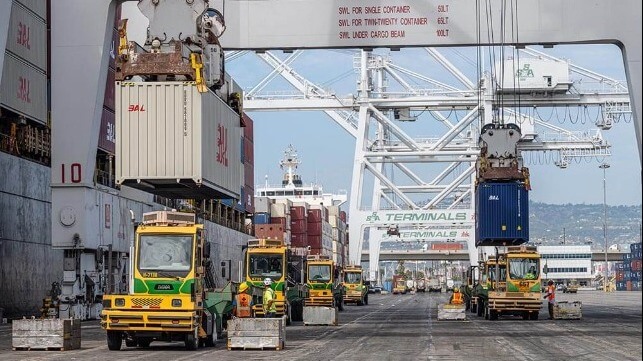ILWU Calls PMA Automation Report Self Serving Before Contract Talks

Representatives of the West Coast labor union for longshore work took to Twitter to respond to a new study sponsored by the association representing the carriers and terminal operators promoting the benefits of port automation. The union, which has consistently opposed attempts to increase automation, predictably called the report “self-serving,” and while saying it had not had the opportunity to review the report sought to marginalize the report by citing the overall loss of jobs from automation.
The Pacific Maritime Association and the International Longshore & Warehouse Union (ILWU) are each posturing in advance of opening formal contract negotiations scheduled to begin on May 12 in San Francisco. It will be the first time in seven years that the two sides have gone to the bargaining table to hammer out a new contract covering all the West Coast ports. The PMA representing the employers had proposed last year a further one-year extension of the contract which was turned down by the union.
The current labor contract expires on July 1 and while few people expect an agreement before then, they do not expect a crippling strike either. In 2014 and 2015, the union staged work slowdowns at different ports along the West Coast during the prior contract negotiations. That resulted in four months of disruptions which could be especially difficult if they are repeated this year as the port struggle to manage congestion.
“It’s apparent that the report is a self-serving document by one party to a labor contract, and even worse is an insult to all workers who have seen their jobs outsourced to machines,” wrote Frank Ponce De Leon, ILWU Coast Committeeman responding for the union to the PMA’s release of the report citing a “win-win strategy” with work gains for the union as well as productivity and efficiency. “The increased productivity that the PMA is claiming at the two automated terminals has meant less work at other terminals and an overall loss of employment for Longshore workers,” responded Ponce De Leon.
The PMA is lining up all the issues ranging from benefits to the environment to the long-term challenges to the ports for future growth and maintaining their competitiveness. They commissioned a study by a University of California, Berkley professor with data from a yard automation company looking at the impact of automation at the two San Pedro port terminals that have been able to deploy automation.
“With physical growth limited and the complex nearing capacity, automation is enabling the expansion of cargo capacity through densification of port terminals,” the PMA wrote. The PMA’ sponsored report says that the two automated terminals are moving containers at times twice as fast as the conventional terminals and that TEU throughput is 44 percent higher through the use of autonomous vehicles and cranes.
The report contends that automation increased ILWU jobs and work opportunities. They said that paid hours grew more than twice the level at the non-automated terminals and that the overall workforce at the Los Angeles and Long Beach ports grew more than at the other 27 West Coast ports.
“We haven't seen an overall increase in productivity at the ports, just a shell game to mask the human cost of job destruction,” counters Ponce De Leon. “The very purpose of automation is to replace human workers with machines, and in this case to harm a U.S.-based workforce and local communities only to increase the profits of the largely foreign-owned terminal operators.”
The union repeated its long-held position that automation costs jobs for its members. They are arguing that the two terminals that were permitted to automate increased volumes at the expense of volume at the other terminals.
The struggle to automate operations at the California ports began 20 years ago when the union agreed to let operators increase their use of technology. The union agreed that the terminals could use a limited amount of automation in its 2008 agreement but then was roundly criticized by the national union organization which also opposed all automation. Since then, the ILWU has blocked further attempts at automation.
